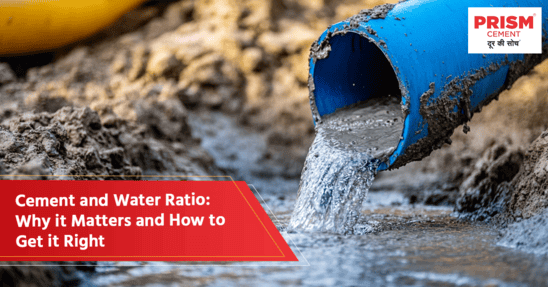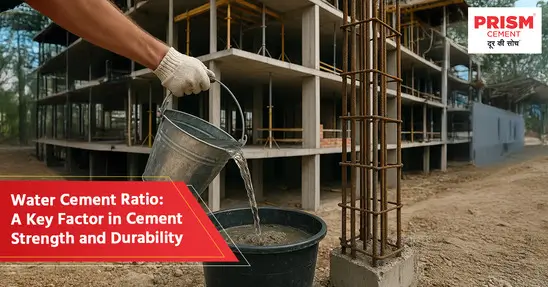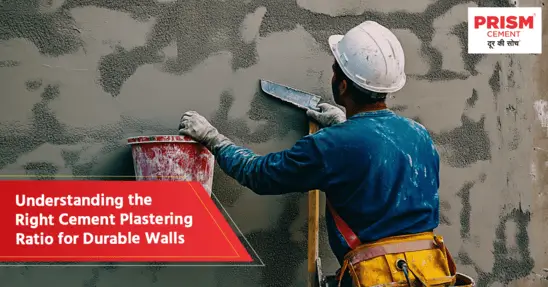When it comes to construction, the cement and water ratio can make or break a project—literally. Get it right and you’ll have strong, durable concrete. Get it wrong and you might face cracks, weak spots or even structural failure. So, what exactly is the cement and water ratio, and why is it so important? Let’s dive in!
What is Cement and Water Ratio?
The cement and water ratio refers to the amount of water mixed with cement to form concrete. It’s expressed as a number like 0.4 or 0.5, meaning for every kilogram of cement, 0.4 or 0.5 kg of water is used.
This ratio impacts the strength of concrete, its workability and its durability. Too much water will weaken the mix, while too little will make it stiff and hard to work with.
Why is the Cement and Water Ratio So Important?
The right ratio will ensure:
- Stronger Concrete: Enhance the compressive strength of cement, ensuring its durability
- Better Workability: Make concrete easier to handle, pour and finish
- Longevity: Resist cracks, shrinkage and environmental damage
- Sustainability: Reduce waste and support sustainable construction materials
What is the Ideal Cement and Water Ratio for Different Projects?
Different projects require different ratios:
- Reinforced Concrete (Beams, Columns, Slabs) → 0.40 - 0.50
- Driveways & Pavements → 0.50 - 0.55
- Brickwork & Masonry → 0.60 - 0.70
- Plastering & Finishing → 0.60 - 0.70
- Ready Mix Concrete → 0.40 - 0.50
Following these guidelines ensures the perfect balance between strength of concrete and its workability.
What Affects the Water-Cement Ratio?
Several factors can influence the ratio:
- Cement Type: Some cementitious materials absorb more water than others.
- Aggregate Size: Larger aggregates need less water and the finer ones require more.
- Weather Conditions: Hot weather may need adjustments to prevent drying.
- Concrete Curing Time: Proper curing ensures full strength of concrete.
- Workability Needs: The slump test for concrete checks if the mix is too dry or wet.
Common Mistakes and How You Can Avoid Them
- Adding Too Much Water can weaken the compressive strength of cement, causing cracks. Stick to the water cement ratio formula to avoid cracks.
- Skipping the Slump Test: This simple test will ensure the mix is at the right consistency.
- Neglecting Concrete Curing Time: Without proper curing, concrete loses strength and then it cracks.
- Using Poor-Quality Water: Impurities in the water affect setting time and durability.
- Ignoring Climate Conditions: Adjusting the mix based on temperature and humidity.
How does the Cement-Water Ratio Affect Construction Quality?
A good cement and water ratio improves:
- Structural Strength: Concrete with the right concrete mix ratio handles heavy loads without cracking.
- Durability: Resists weathering, moisture and wear over time.
- Sustainability: Prevents material wastage and supports sustainable construction materials.
Conclusion
The cement and water ratio is a small but critical detail in construction. Whether you're working with ready mix concrete, reinforced structures or plastering, maintaining the right water cement ratio formula will ensure long-lasting, high-quality results.
Avoid common mistakes, such as not using the slump test for concrete, and ensure proper concrete curing time. Get it right, and your project will be strong, durable and built to last.
Frequently Asked Questions (FAQ)
Q1. Why is the cement-to-water ratio crucial?
Answer: It affects the strength of concrete, durability and ease of use.
Q2. What happens with too much water?
Answer: Excess water weakens the compressive strength of cement, leading to cracks and failure.
Q3. How does the ratio impact concrete strength?
Answer: A lower ratio increases strength; too much water weakens it.
Q4. What’s the ideal ratio for different projects?
Answer:
- 40 - 0.50 for reinforced concrete
- 50 - 0.55 for pavements
- 60 - 0.70 for masonry and plastering
Q5. How to control water content?
Answer: Use the water cement ratio formula, perform a slump test and follow proper concrete curing time.




